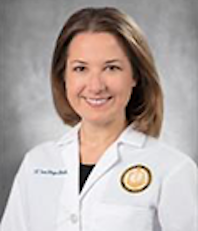Q & A: Drs. Jay Doucet and Amy Liepert
Calling on California to ‘Stop the Bleed’
Each year, about 2 million people around the world die from hemorrhaging, or blood loss, and as many as 1.5 million of these deaths are the result of physical trauma, including gunshot wounds. In the United States, 60,000 people per year die from bleeds.

 UC San Diego’s Amy Liepert, MD, FACS, of our Division of Trauma Surgery, and Trauma Chief Jay Doucet, MD, FRCSC, FACS, have been instrumental in championing California Assembly Bill 2260, which would mandate that STOP THE BLEED® bleeding control kits be added to all public buildings with capacity over 200.
UC San Diego’s Amy Liepert, MD, FACS, of our Division of Trauma Surgery, and Trauma Chief Jay Doucet, MD, FRCSC, FACS, have been instrumental in championing California Assembly Bill 2260, which would mandate that STOP THE BLEED® bleeding control kits be added to all public buildings with capacity over 200.
This week, AB2260 – which is authored by Assemblymember Freddie Rodriguez and co-authored by Senator Ben Hueso – received unanimous support from the California State Assembly. Next it moves to the State Senate.
Drs. Liepert and Doucet, along with other champions of this bill (including the Northern California, Southern California, and San Diego Chapters of the American College of Surgeons), are calling for a mass showing of voter support to get the legislation passed by the California State Senate. Here they share with us the importance of the bill, where it might be headed, and why the efforts to “Stop the Bleed” don’t stop with the state legislature.
Q: What are STOP THE BLEED® Kits, and why are they so important?
AL: An adult can bleed to death in less than five minutes if a major blood vessel is severed. Because they provide a way to act immediately, these kits could save lives in any number of circumstances: in situations of interpersonal violence, natural disasters, car crashes, industrial or construction incidents. It’s important to have these kits in the community so that trained people have tools available. The STOP THE BLEED® kits include a mask, gloves, gauze packing, trauma shears to expose clothing as necessary, and a certified tourniquet.
The idea for STOP THE BLEED® kits came out of military training. Modern military conflicts marked by use of IEDs (improvised explosive devices), the military found that soldiers were dying of bleeding to death, even when their injuries were survivable. Military training using tourniquets. This was adapted by the American College of Surgeons for civilian training, known as STOP THE BLEED® after the Sandy Hook School Shooting.
Q: Now that the bill has passed the State Assembly, what happens next?
JD: There has been interest for many years in many states to have kits in public places, and four or five other states have passed STOP THE BLEED® laws already. Our bill is by far the most aggressive, comprehensive bill in the country. The first STOP THE BLEED® bill in California, a bicameral bill, was first introduced 5 years ago. Last year SB 687 authored by Sen. Ben Hueso modeled placing STB kits in public buildings with the same requirements as AEDs. Assemblyman Rodriguez took up this updated bill structure with AB 2260 this year. SB 687 made it through both state houses last year, but when it went to the Assembly Appropriations Committee, it died. The bill previously never had great coordination with trauma centers and languished. It is not uncommon to see a bill take multiple years to get through the process, but strong advocacy is always required to inform and educate the public, other stakeholders and the legislators themselves.
AL: AB2260, will make it a state statute that STOP THE BLEED® kits are added to the same buildings that are required to have AEDs (defibrillators). We anticipate with ongoing support it will progress through the Senate Health, Judiciary, and Appropriations Committees – the same places the prior version SB 687 received wide support. After a general vote in the Senate it must be signed by Gov. Gavin Newsom bills by the end of September.
Q: What other efforts have you made to get out the word about Stop the Bleed?
JD: Even for medical professionals who don’t stop bleeds day in and day out – it’s important for them to get training. Dr. Liepert and I went to Sacramento April 19 for California Medical Association Day and did a demo for the State Legislature. May is Stop the Bleed Month and May 20 was National Stop the Bleed Day, so we’ve focusing on offering more courses throughout San Diego. Stop the Bleed training programs are free, and we created a YouTube video so anyone can learn, in advance, how to stop the bleed.
Q: Why is it important for surgeons to be civically engaged?
AL: Surgical health policy advocacy is important for all surgeons and healthcare workers to participate in to ensure quality surgical care, access to surgical care, and promotion of the profession to prevent disease and injury. I can take care of one patient at a time – and that’s incredibly important work – but if I can change a law or influence a policy, I can impact hundreds, thousands, and maybe even many more people.
